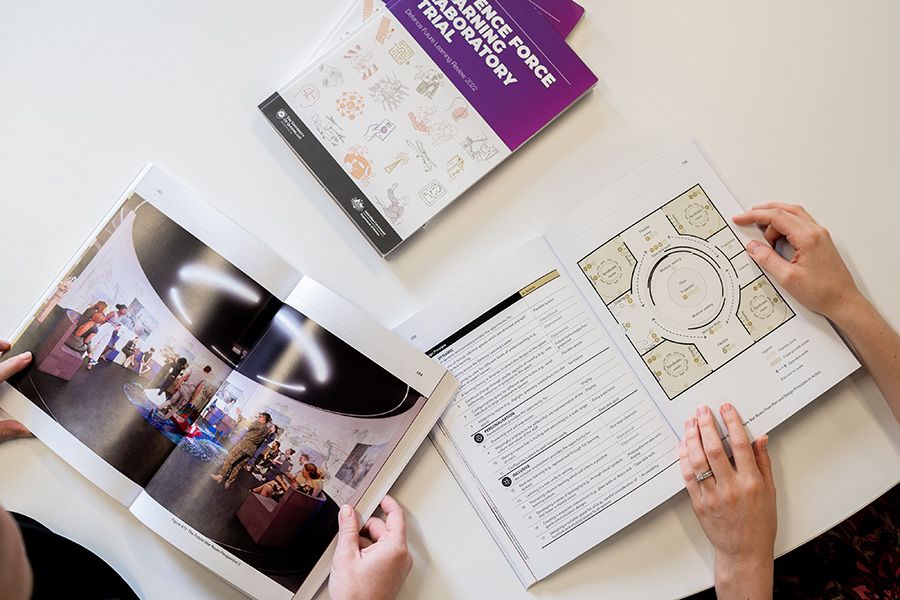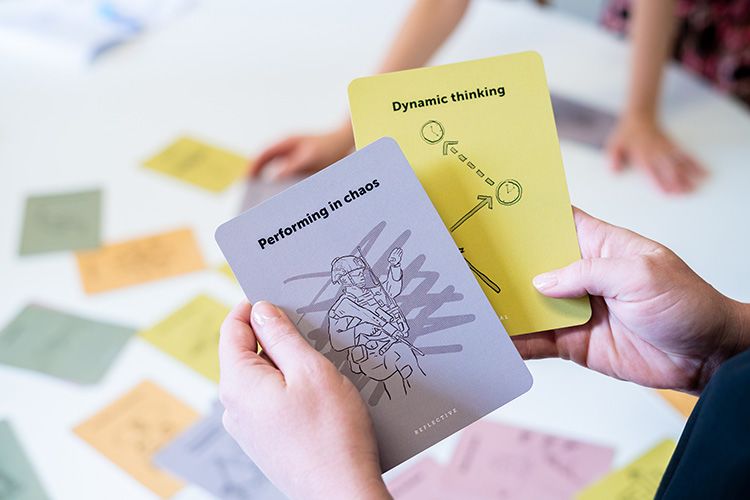Ready for anything: educating for conflicts of the future

Sponsored by

Sponsored by

The world faces an uncertain geopolitical future, and advances in technology make it difficult to predict what the future of warfare will look like.
So, how can defence forces around the world educate personnel to fight in an ever-changing environment?
To help the Australian Defence Force (ADF) educate personnel for an unpredictable future, University of Queensland researchers Professor Cara Wrigley and Dr Karla Straker led a project using a design innovation approach to develop plans for 3 unique learning spaces.
Now, their research is making an impact in Australia and around the world.
Professor Wrigley and Dr Straker, who have both worked in defence learning design previously, and their team of researchers were approached by the Department of Defence to design prototypes for 3 learning laboratories of the future.
“We have actively investigated the design thinking process in many different contexts and organisations,” Professor Wrigley said.
The team undertook a rigorous design process, which included creating a set of cards to determine the priority cognitive capabilities – like dynamic thinking, creativity, and mental flexibility – that ADF personnel will need in the future.
“This was followed by a Canberra-based co-design workshop, which allowed the ADF to contribute ideas and experiences to the creative mix,” Professor Wrigley said.

Professor Cara Wrigley (left) and Dr Karla Straker
Underpinned by design thinking and design innovation, the team explored how design can be applied to solve complex problems by reviewing literature and analysing the ADF’s existing teaching practices.
At the end of the design process, 3 lab concepts – DefenceX, Learning Lockers, and the Future War Room – were presented to the ADF.
Professor Cara Wrigley (left) and Dr Karla Straker
About the labs
DefenceX:
- A dynamic and collaborative space for formal and informal learning
- Develops cognitive capabilities and helps personnel create solutions to complex challenges
Learning Lockers:
- Mobile, flexible, self-contained spaces for individual and small group work
- User-led reflective learning, conflict resolution and networking
The Future War Room:
- A reconceptualised traditional classroom for people of all ranks to collaborate
- Facilitates war games, planning and problem solving

The labs designed by Professor Wrigley and Dr Straker’s research team will have a significant impact on how defence learners of the future are prepared for conflicts.
The spaces are adaptable and dynamic, facilitating collaboration between members of all ranks.
The technology, layout and purpose of each lab is flexible, which means they can be reconfigured when the global conflict situation changes.

The Learning Lockers, or mobile labs, were also designed to be portable, so recruits and existing personnel all over the country, and even overseas, can learn wherever they are stationed.
Ensuring that the labs were designed in a way that keeps learners engaged was a priority for the research team.
“The labs will allow the Department of Defence to recruit personnel and keep personnel engaged throughout their career by educating them in the way they want to be educated,” Professor Wrigley said.
“It’s important to engage learners in ways that inspire and empower them.”
“The characteristics of warfare have changed and so, too, must the way in which we educate our personnel for it,” Professor Wrigley said.
“Previous conflicts have remained domain specific – air, maritime, land, space and cyber. However, future conflicts will require more of a joint approach.
“To prepare for any possible future conflicts, we need to see our people as the capability advantage alongside our major capabilities – not the other way around.”
At the project’s core was the need to bring Defence learning into the 21st century to prepare learners for future conflicts, the likes of which have not been seen before.
As part of this, the Future War Room lab design facilitates gamified learning, which allows learners to experience a virtual conflict environment, plan and solve problems before entering a real-world environment.
This technology can be updated according to emerging challenges and new developments in conflict technology.
“A dominant focus on just the history of warfare is not enough to underpin an education curriculum,” Professor Wrigley said.
“The future war fighter requires cognitive capabilities that prepare future leaders for future uncertain times.”

The team also developed virtual reality versions of their labs, so defence forces the world over can explore and be inspired by their designs.
International defence forces and researchers are already using the designs to inform their own practice.
Professor Wrigley said that the teaching and learning environment at UQ supported the team’s approach to design.
“By partnering with UQ, we could take an experimental, deliberately disruptive approach to imagine what learning inside the ADF could look like in the future,” Dr Straker said.
“The teaching and learning environments at the University that we are surrounded by every day were a good starting point to understanding that selecting the most appropriate tools and technology in the learning process is complex and vital.”